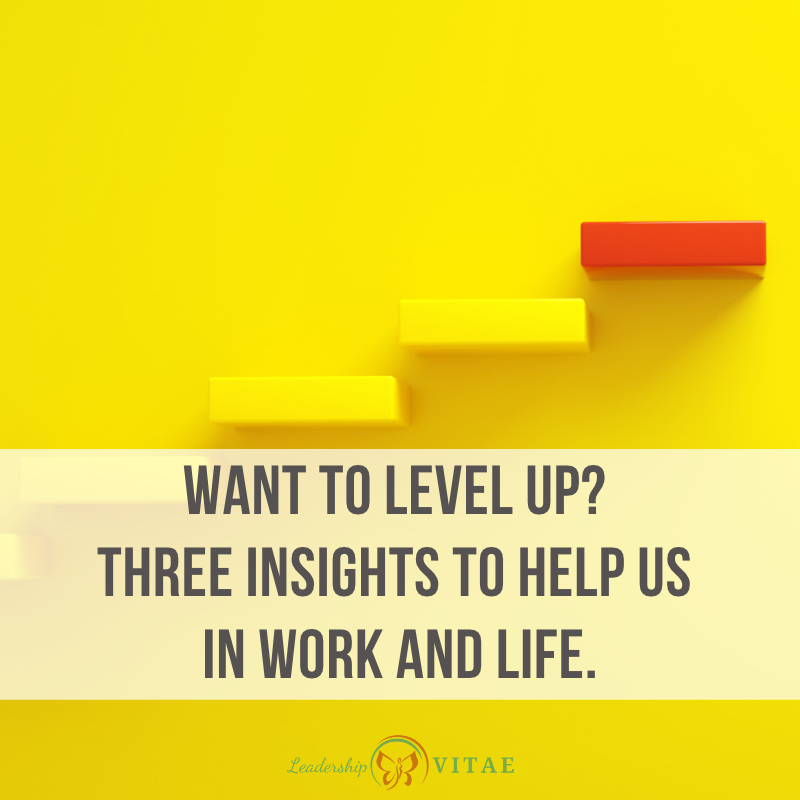
As a life-long learner, books are like food…necessary to function. Some are simply fuel and may be quickly forgotten. The best meals linger, as do the best books. The latest one I find myself referring back to is Leveling Up: 12 Questions to Elevate Your Personal and Professional Development by Ryan Leak.
This is a book I’d recommend to anyone committed to growth, but particularly for leaders and parents. If we are in any way responsible for other humans, it’s worth a read.
While all 12 questions are relevant and made powerful through Leak’s shared stories, there were a few that nearly stopped me in my tracks. That could have been dangerous since I read while I work out on the elliptical machine!
After safely ending the workout (only taking a few notes along the way), I reflected on three lessons that stood out the most.
1. No Service Mode
For the entirety of my career, I’ve been connected. Almost constantly. As someone that has worked in tech for longer than I’d like to admit, I’ve been an early adopter of all tethering devices.
There are parts of tethering that have been a blessing, like the ability to work remotely. However, for most of us, smart phones have made us accessible at all hours of the day and night. And that can be detrimental to our mental health.
In my old neighborhood, there were dead zones. I’d get so frustrated as I’d attempt a “walk and talk” and experience dropped calls. I didn’t want to be tethered to my desk too, so it was beyond irritating.
That “no service” mode can be seen as an inconvenience, or a gift. When in our day/lives do we make ourselves unavailable and not be of service to anyone but ourselves? If we can’t think of the last time we were inaccessible, it may be worth scheduling some.
Silent mode is relatively new to me, but a complete game changer. Lunch time? Silent. Writing? Silent. Time to unwind and sleep? Silent.
When is your “no service” or silent time?
2. Know the dreams of those that matter to you
As an altruistic leader, I am a firm believer in helping others. Along the way, I’ve had to learn that truly helping people means helping in the way that serves them and what they dream of.
How many of us ask about dreams? What someone really wants in life or work? Too often, we assume that what we value or aspire to is the same for others. That’s not altruism, it’s projecting.
What hit like a ton of bricks reading the book is the question: do we know the dreams of those that matter most to us? Our children, spouses, or dear friends? Do we know the innermost desires of their hearts?
This can be so difficult, when what they dream of may conflict with our desires for them to be safe or stable and secure. Maybe they are a risk-taker aspiring to be an entrepreneur, and all we can think is how many small businesses fail in the first year.
My son wants to be a motorcycle racer. It scares the hell out of me, but I also know that he’s going to do what he’s going to do as soon as he turns 18. I can either support him or risk his resentment. While I’m afraid, I’ve been working with him to figure out how to allow his dreams to coexist with the need take care of himself financially.
It can be so challenging to put aside our dreams and fears in our relationships and center the other person. Yet if we really want to help, we need to help in the way that serves them best.
3. Own your average
Oh, this one hurt. Because it’s true. None of us are as amazing as we think we are.
With enough observations, everything in nature approaches a bell curve. Including us pesky perfectly flawed humans. That means that only half of us can be above average, and most not that much better than average. Yet we are often blind to our skill, ability, intelligence.
This is demonstrated most clearly through the Dunning-Kruger effect. Those that are highly skilled tend to underestimate their ability, while those that are less talented overestimate. That means if we’re convinced we are amazing, it’s highly likely that we aren’t.
Ryan encourages us to own our average. Our true ability is often a mix of great, meh, and not so great. When we know and own the reality, then we can invest and affect meaningful change. Instead, if we are convinced we’re already amazing, not only are we probably falling short but we think we don’t need to do anything about it to improve.
Bonus: Who really knows you?
I have a love/hate relationship with authenticity. While I am a firm believer and do my best to show up authentically in all of my relationships, it’s not safe, practical, or prudent to reveal all of ourselves all the time.
When we think about our relationships, there are circles of familiarity. Those on the periphery that receive what we show the world at large or a stranger on the street. Co-workers, acquaintances, and extended family who may know us beyond a superficial level, but that we don’t share with deeply. Then there’s the close friends and family. The ones that really know us.
But do they really? Each of us needs at least one person that we can be wholly ourselves. Without filter or judgement. No hesitation.
We can’t be 100% authentic all the time and shouldn’t aspire to be. Instead, we can pick one person that knows the real us. Who we are in the light and the dark, in good times and bad without flinching.
* * *
Which of these resonate with you most and why? I’d love if you would share your thoughts in the comments.








